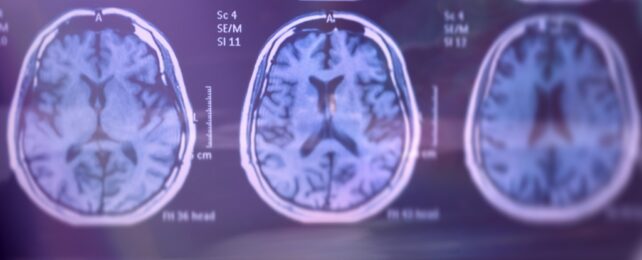We know that inheriting two copies of a specific gene variant, called apolipoprotein E4 (APOE4), greatly increases the risk of developing Alzheimer's disease later in life.
Now, a new study has found that people with two copies of APOE4 are all but certain to develop Alzheimer's if they live long enough. The findings suggest two copies are not just a risk factor but an underlying cause of the disease, which means it could be considered a distinct genetic form of Alzheimer's.
In an analysis of over 13,000 people, researchers from Spain and the US found that 95 percent of people over 65 with two copies of APOE4 had biological markers in cerebrospinal fluid that are typical of a genetic form of Alzheimer's.
"The data clearly show that having two copies of the APOE4 gene not only increases the risk, but also anticipates the onset of Alzheimer's, reinforcing the need for specific preventive strategies," says neurologist Alberto Lleó from the Sant Pau Research Institute in Barcelona, a co-senior author of the study.
Mutations in three other genes are known to cause early-onset autosomal dominant Alzheimer's disease (ADAD). An extra copy of one of these genes, APP, is thought to play a role in Alzheimer's developing in over half of those with Down syndrome.
But these inherited, early-onset cases are rare. The majority of Alzheimer's cases occur sporadically later in life without a known genetic cause. The APOE gene, particularly the APOE4 variant, is one known risk factor for late-onset Alzheimer's disease.
The consistent way in which inherited, early-onset forms of Alzheimer's progress has shed some light on how late-onset versions of the disease might develop. Lleó and his colleagues wanted to compare these changes to people with copies of APOE4.
They analyzed postmortem brain samples from 3,297 donors at the National Alzheimer's Coordinating Center, as well as brain scans and biomarker data from 10,039 patients in five clinical cohorts. The postmortem data included 273 people with two copies of APOE4, and the clinical cohorts included 519.
Most studies group everyone with one or two copies of APOE4 together, but the analysis found that those with two have a pattern of biomarker changes similar to those in ADAD and Down syndrome, rather than those seen in people with one copy of APOE4. People with two copies also show specific changes in the size of brain regions associated with memory, which might affect how Alzheimer's presents.
From age 55, most people with two copies of APOE4 had higher Alzheimer's biomarker levels than those with two copies of a different and less risky APOE variant, called APOE3. By the time those with two copies of APOE4 were 65, almost all had abnormal amyloid levels in their cerebrospinal fluid.
In Alzheimer's disease, beta-amyloid and tau, both essential proteins for brain function, turn toxic and clump together. Amyloid plaques form clumps on the outside of neurons, and tau tangles damage them from the inside.
"This gene has been known for over 30 years and it was known to be associated with a higher risk of developing Alzheimer's disease," says first author Juan Fortea, a neurologist from the Sant Pau Research Institute.
"But now we know that virtually all individuals with this duplicated gene develop Alzheimer's biology. This is important because they represent between 2 and 3 percent of the population."
They also found that APOE4 homozygotes begin to experience symptoms at approximately age 65, about ten years earlier than those who carry other variants of the APOE gene.
"The findings emphasize the importance of monitoring APOE4 homozygotes from an early age for preventive interventions," says molecular biologist Víctor Montal, a co-senior author who worked at the Sant Pau Research Institute at the time of the study.
Researchers now look at Alzheimer's as a biological condition that can be diagnosed by looking for biomarkers, even if there are no clinical symptoms. While there are no treatments for the presymptomatic stage of the disease, this new information could help scientists develop some.
Most patients were of European ancestry, so further research is needed in diverse populations. If APOE4 homozygosity is reclassified as a genetic form of Alzheimer's disease, it could change how clinical trials are designed, and millions of people in the US alone could be diagnosed with Alzheimer's before they show signs of cognitive decline.
"The study concludes that APOE4 homozygotes represent a genetic form of Alzheimer's disease, suggesting the need for individualized prevention strategies, clinical trials and treatments," the authors write.
The research has been published in Nature Medicine.
